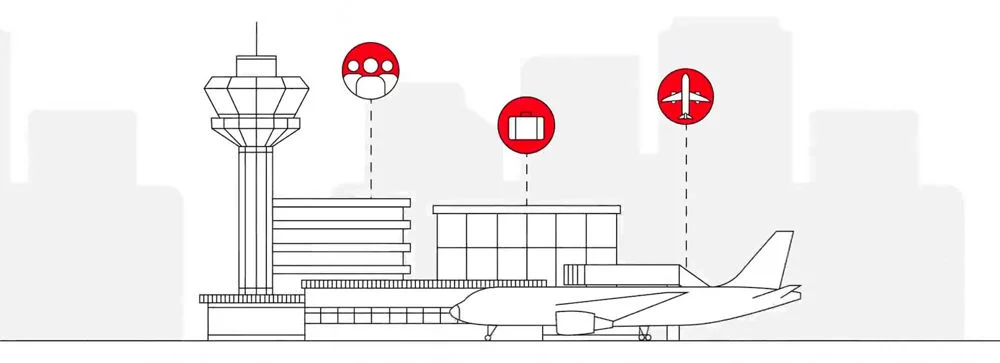Discover more
Find out more about how we're applying our expertise to develop truly smart buildings.
Get in touch
To learn more about Neuron and how we may be able to assist, please contact our team.
If buildings had a ‘brain’, monitoring their systems and responding in real time, how much more secure, comfortable and efficient could they become? We are answering that question with Neuron, using artificial intelligence to make our buildings, districts and cities healthier, more sustainable places to live and work.
Neuron is an app that integrates our insights into the built environment with emerging digital technologies into a single platform. It uses 5G and the Internet of Things to gather real-time ‘sense data’ from equipment and systems. It uses Building Information Modelling (BIM) to display these complex data sets through a cloud-based, centralised management console. Neuron’s ‘brain’ uses artificial intelligence and machine learning to analyse, optimise and automate operations.

Neuron unlocks smarter, data-driven decision making: for facility managers; for building owners; for city authorities. We have created four applications that put them in control of the energy they use, the health and well-being they provide and the carbon emissions they produce:
- Neuron Building
- Neuron Health
- Neuron Carbon
- Neuron City
The insights they create are informing the way a new generation of smart buildings and infrastructure are designed, constructed, managed and maintained.
Neuron Building: smart buildings, smarter decisions
Heating, ventilation and air conditioning (HVAC) systems give us year-round comfort but are huge (and costly) consumers of energy. The data traditional building automation and control systems generate has allowed operators to monitor and react to changes in these systems. Real efficiency, however, comes from the ability to anticipate, not just record and respond. Neuron Energy is an app that turns this data into predictive control.
Arup Neuron’s trend analysis feature allows forecasting of energy demand to better match cooling loads – the rate at which heat is removed from an environment - to occupancy. Discovering dips in equipment performance curves allows for early fault detection and preventative maintenance. Neuron’s self-learning abilities mean it continually refines and improves its forecasts, translating that learning into the energy efficiency of the systems it controls.

One Taikoo Place is Hong Kong’s first AI-enabled, data-driven smart building. Neuron’s cooling load predictions are within 5% of actual use, helping developer Swire Properties successfully reduce energy use by 15%.
Apart from energy saving through advanced data analytic capabilities, machine learning and predictive maintenance, Neuron also helps create a better indoor environment that focuses on the health and wellbeing of the occupants, delivering the best value to the tenants
Neuron Health: healthier buildings, healthier rentals
Air quality makes the difference between so-called ‘sick’ buildings and healthy ones. It not only affects the health of the individuals working in a building. As companies increasingly prioritise the well-being of their people, healthier buildings also translate into healthier rentals.
Neuron Health monitors temperature, humidity and levels of pathogens in the air, identifying the correlations between indoor air quality and occupants’ health. Its predictive modelling gives building operators visibility of the risks and identifies measures to mitigate them.
Implemented in Beijing's Water Cube building, Neuron facilitates the digitalisation of venue facility management. We helped develop a smart platform incorporating BIM, IoT and analytics for better asset management, while contributing to a digital transformation model that helps optimise the operations of future sports venues.
Neuron Carbon: intelligent sustainability
Carbon emissions cost. In environmental impact and in energy bills. Neuron Carbon is providing an intelligent way to reduce those costs. It allows building operators to benchmark their resource management performance.
Neuron captures a complete record of emissions from the whole ecosystem of a building. From direct, onsite emissions such as generators and cooling systems to company cars, purchased energy, water, material and waste recycling. The analysis Neuron’s algorithms provides helps set targets and implementation plans, reducing carbon and providing an evidence base for carbon credits.
Neuron City: from smart buildings to smart cities
The insights Neuron’s digital platform creates are not limited to individual buildings. Asset owners can monitor, control and compare performance across their whole campus or portfolio. With Neuron City, we are working with authorities to bring that same level of insight and control to entire city networks.
Predicting responses
Meteorology can give us advanced warning of events like a typhoon, but how can we predict how a city in its path will respond?
Working with Hong Kong’s electrical and mechanical services department, Neuron City is integrating the government’s Internet of Things with a Geographic Information System to visualise the whole city’s performance. The video wall in the department’s control room monitors the real time situation, anticipating how a typhoon may affect city infrastructure such as traffic lights and helping authorities plan their response.
Awards
-
Smart Business Award (Big Data and Open Data Application) – Gold Award
Hong Kong ICT Awards 2020
-
BIM Projects 2020
Construction Industry Council Celebration of BIM Achievement 2020
-
Certificate of Merit in Category II – An Innovative Application of Engineering Theories
HKIE Innovation Award 2020
-
Digital innovation of the year: Monitoring systems – Winner and Buildings Technology Innovation of the Year – Winner
The Energy Awards 2021
-
Smart Cities Award (Private Sector/NGO) – Award Winner
2021 WITSA Global ICT Excellence Awards
-
Technology category (Big Data) – Winner and Industrial category (General) – Merit
The 20th Asia Pacific Information and Communications Technology Alliance (APICTA) Awards
-
Open Section – Champion and HK Electric Best Innovation Award – Winner
IET Young Professionals Exhibition and Competition 2021
-
COVID-19 Achievement Award
Chartered Institution of Building Services Engineers (CIBSE) Hong Kong Awards 2021
Digital solutions and tools
Our experts in software and product development design and develop robust applications and tools to enable better decision making for our clients.


